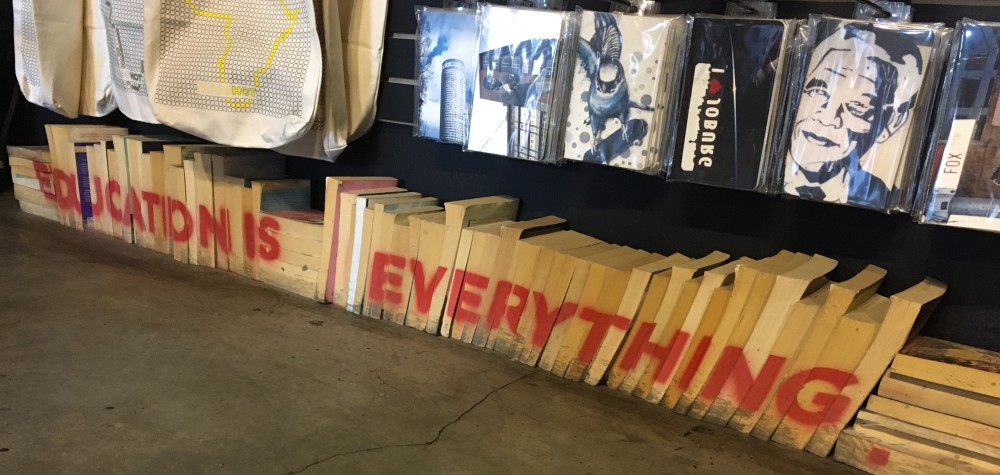Goals of the tribal college educational program are:
This program is intended to give a face and presence to U.S. tribal colleges as a unique entity within higher education. The focus of the trip is designed to bring attention to American Indian college students and tribal colleges who so often are mere footnotes in publications and who get little attention in higher education scholarship. Inequity in resources and lack of learning opportunities are serious and persistent problems that are all too common on many American Indian reservations where most tribal colleges are located.
Breaking down barriers for the educational advancement of American Indians can be promoted through research and the support of higher education administrators with a passion for improving their circumstances. By the agency of this experiential learning program, combined with classroom preparation, participants will be better suited to recognize and appropriately assist underserved and marginalized communities of learners.
We will seek out best practices for American Indian student support by concentrating the focus of this trip on learning specifically about the Lakota of South Dakota. Our interactions with educators and community members on the Pine Ridge and Rosebud reservations will help inform our understanding of the challenges faced by students at tribal colleges. Our visits to public, four-year universities will enable us to learn about the success and shortcomings of support programs in place for Americans Indian students and alumni.
Program Design and Experiential Learning Approaches
The program is designed to engage students from multiple disciplines in thoughtful inquiry into their own diverse experiences and to give them opportunities to develop the skills to interpret and communicate their experiences in intercultural conversations with others. The project leaders are not experts in Lakota history and culture. However, they do have experience facilitating cross-cultural experiences. Students will participate in an engaged learning experience, and reflect upon their experiences through both journaling and discussions. Participants will learn about Lakota history, culture, and education; students will also enhance their aptitude as competent communicators in intercultural settings and will draw upon these skills as they return to campus and future personal, academic and work settings.
We intend for the experience to be both richly individual and intensely group-oriented. While at Oglala Lakota College it is our intent that each participant will have opportunities for personal, direct interactions with members of the Lakota community, beyond our structured meetings. We know that this will significantly contribute to their experience, and to the skills that we want to instill in future higher education administrators.
Impact on Learning
By interacting with the members of the Lakota community, as well as education professionals vested in the academic and long-term success of American Indians, students will gain skills and knowledge they can transfer to new situations. And, as future academic leaders, this will not only serve to better participants’ personal career opportunities, but also advance the goal of successfully supporting American Indians at institutions where our alumni gain employment.
Some of the key people we will meet are:
- Nichole Boyd, American Indian Student Academic Services Coordinator for the University of Wisconsin.
- Harry Thompson, Executive Director of the Center for Western Studies, Augustana College.
- Harold Salway, Director of the Oglala Sioux Parks and Recreation Authority. Besides being the current director of the OSPRA, Harold is past tribal president for the Oglala Lakota.
- Tom Shortbull, President of Oglala Lakota College. Mr. Shortbull has been president of OLC since 1994. He also serves as an instructor in Tribal Law and Government, Federal Indian Law, U.S. Government, U.S. History, Lakota History, and Lakota Culture.
- Anthony Fairbanks, Superintendent of Little Wound School, Pine Ridge reservation. Dr. Fairbanks received his doctoral degree from the University of Minnesota in educational policy and administration. Prior to his appointment with Little Wound in 2012, Dr. Fairbanks spent five years as the head of the Laguna Pueblo Department of Education, overseeing the tribal education program from early headstart to college.
- Jason Murray, Director of the Indian University of North America, Crazy Horse Memorial Foundation. Dr. Murray’s research interests include rhetoric, Native American literature and American literature.
- Jesus Trevino, Associate Vice President for Diversity, University of South Dakota. Dr. Tevino earned his master’s and doctoral degrees from UCLA. Prior to arriving at USD in 2012, he was associate provost for multicultural excellence and clinical associate professor in education at the University of Denver. Trevino also served as assistant dean for cultural diversity and director of the Intergroup Relations Center at Arizona State University from 1992 to 2002.
- Tracy Peterson, Director of Diversity Programs and K-12 Outreach for the University of Iowa College of Engineering. Tracy is involved with the University of Iowa Alumni Association’s Latino and Native American Alliance program.
